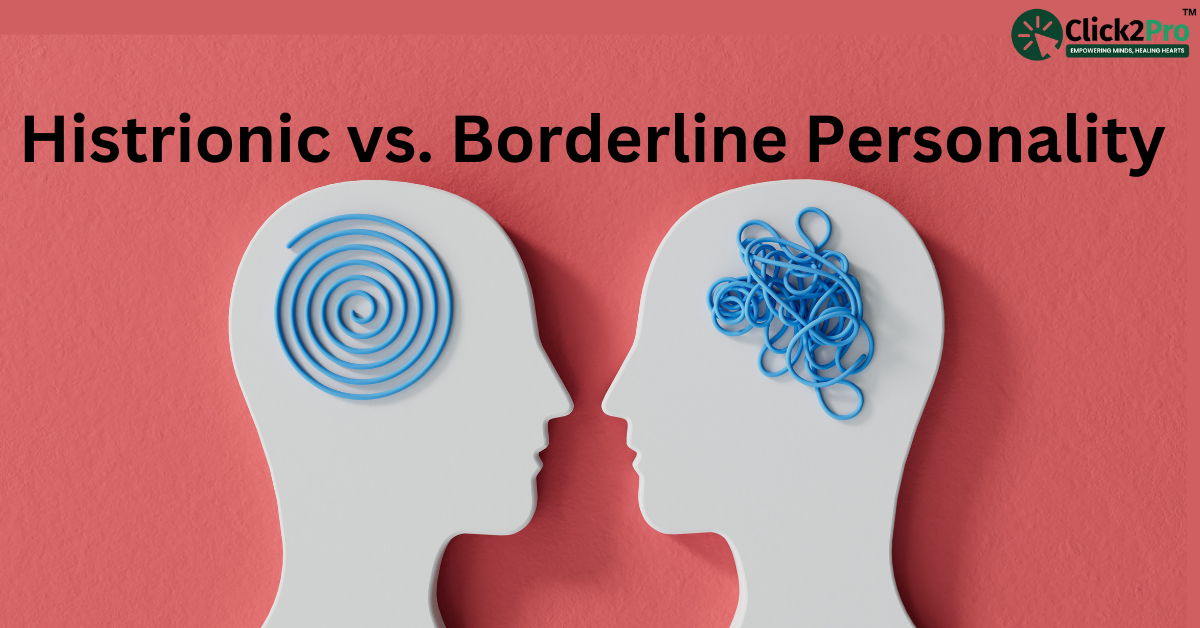
Histrionic vs. Borderline Personality Disorder: Key Differences
Table of Contents
Understanding the nuances between Histrionic Personality Disorder (HPD) and Borderline Personality Disorder (BPD) is crucial for accurate diagnosis and effective treatment. Both disorders fall under the Cluster B category of personality disorders, characterized by dramatic, emotional, or erratic behaviors. However, they exhibit distinct patterns that set them apart.
Emotional Expression and Regulation
Individuals with HPD often display exaggerated emotions and seek attention through dramatic behaviors. Their emotions can appear shallow and rapidly shifting, primarily aimed at gaining approval from others. In contrast, those with BPD experience intense emotional fluctuations, often stemming from a deep-seated fear of abandonment. Their emotional responses are profound and can lead to impulsive actions, such as self-harm or substance abuse.
Interpersonal Relationships
People with HPD tend to form relationships that are superficial, relying on charm and flirtatious behavior to maintain attention. Their interactions may lack depth, focusing more on the immediate gratification of being noticed. Conversely, individuals with BPD often have tumultuous relationships marked by a pattern of idealization and devaluation. Their intense fear of rejection can lead to clinginess or sudden withdrawal, making it challenging to maintain stable connections.
Self-Image and Identity
A person with HPD may have a self-image that is heavily influenced by the opinions of others, leading them to adapt their behavior to fit in or stand out as needed. They might dress provocatively or exaggerate stories to remain the center of attention. In contrast, someone with BPD often struggles with a fragmented sense of self, experiencing identity disturbances that can result in sudden changes in goals, values, or career aspirations. This unstable self-image contributes to their overall emotional instability.
Behavioral Patterns
HPD is characterized by a constant need for approval and a tendency to be easily influenced by others. Individuals may engage in seductive or provocative behavior to draw attention. They often perceive relationships to be more intimate than they are, leading to misunderstandings. On the other hand, BPD is marked by impulsive behaviors, such as reckless driving, binge eating, or substance abuse. These actions are often attempts to cope with emotional pain or feelings of emptiness.
Case Study: Illustrating the Differences
Consider two individuals from Hanumangarh:
Rina, a 28-year-old teacher, frequently dresses in bright, attention-grabbing outfits and often shares dramatic stories about her life. She becomes uncomfortable when she's not the center of attention and tends to perceive casual acquaintances as close friends. Her behavior aligns with characteristics of HPD.
Amit, a 30-year-old engineer, experiences intense mood swings and has a history of unstable relationships. He fears being abandoned and sometimes engages in self-harm when he feels rejected. Amit's experiences are indicative of BPD.
Treatment Approaches
While both disorders benefit from psychotherapy, the approaches differ:
HPD: Cognitive Behavioral Therapy (CBT) can help individuals recognize and modify attention-seeking behaviors. Therapy focuses on developing deeper, more genuine emotional responses and improving interpersonal skills.
BPD: Dialectical Behavior Therapy (DBT) is particularly effective, emphasizing emotional regulation, distress tolerance, and interpersonal effectiveness. DBT helps individuals manage intense emotions and reduce self-destructive behaviors.
Online Counselling in India
For residents of Hanumangarh and other parts of India, accessing mental health services can be challenging due to limited local resources. Online counselling platforms offer a viable solution, providing access to qualified therapists who can assist with disorders like HPD and BPD. These platforms ensure confidentiality and convenience, making mental health support more accessible.
For individuals seeking support with HPD or BPD, finding a psychotherapist near me can be a crucial first step toward personalized and effective treatment.
Conclusion
Distinguishing between Histrionic and Borderline Personality Disorders is essential for effective intervention. While both involve emotional dysregulation and interpersonal challenges, their manifestations and underlying motivations differ. Recognizing these differences enables individuals and healthcare providers to pursue appropriate treatment strategies, leading to improved outcomes
FAQs
1. What is the key difference between Histrionic and Borderline Personality Disorder?
Histrionic Personality Disorder (HPD) focuses on attention-seeking behaviors and exaggerated emotions, while Borderline Personality Disorder (BPD) is characterized by emotional instability and intense fear of abandonment. The core distinction lies in how these emotions and behaviors manifest in interpersonal relationships.
2. Can a person have both Histrionic and Borderline Personality Disorders?
Yes, it is possible for someone to have traits of both HPD and BPD or even meet the diagnostic criteria for both. This overlap is common with personality disorders, but a professional evaluation is essential for proper diagnosis and treatment planning.
3. How do therapists differentiate between HPD and BPD?
Therapists assess patterns of emotional regulation, interpersonal relationships, and behavioral tendencies. HPD is marked by superficial charm and attention-seeking, while BPD involves deeper emotional struggles, impulsive actions, and fear of abandonment. Structured diagnostic tools and interviews often help make this distinction.
4. Which therapy is best suited for Histrionic Personality Disorder?
Cognitive Behavioral Therapy (CBT) is highly effective for HPD, as it focuses on reducing attention-seeking behaviors and fostering deeper emotional connections. Interpersonal therapy can also be helpful in addressing relationship dynamics.
5. Is Borderline Personality Disorder more severe than Histrionic Personality Disorder?
Severity depends on the individual and their specific symptoms. BPD is often considered more intense due to self-harming tendencies, emotional instability, and challenges in maintaining relationships. However, both disorders can significantly impact an individual’s quality of life if left untreated.
Transform Your Life with Expert Guidance from Click2Pro
At Click2Pro, we provide expert guidance to empower your long-term personal growth and resilience. Our certified psychologists and therapists address anxiety, depression, and relationship issues with personalized care. Trust Click2Pro for compassionate support and proven strategies to build a fulfilling and balanced life. Embrace better mental health and well-being with India's top psychologists. Start your journey to a healthier, happier you with Click2Pro's trusted online counselling and therapy services.






